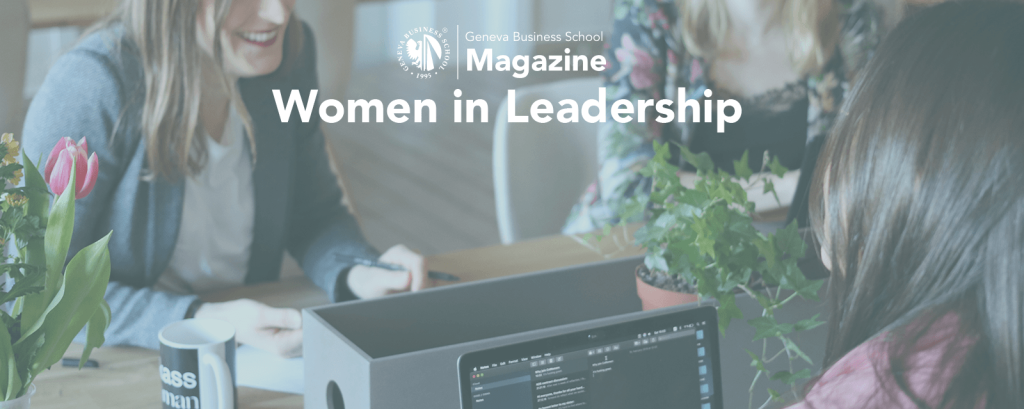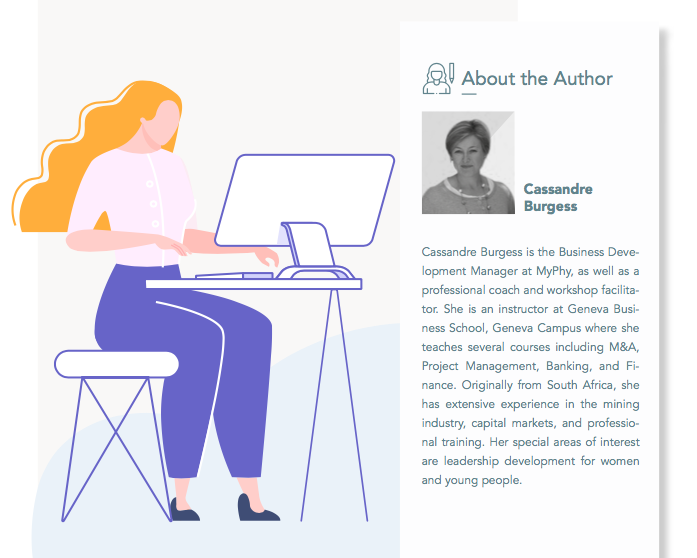The Network Effect
How aspiring women leaders can build a powerful network through mentorship
There are several reasons for this: firstly, it is only relatively recently that women have truly broken through the glass ceiling and have started to occupy senior levels of management and leadership, which flows into the second point: women leaders need to occupy a particular position of seniority before they can champion the cause of other women or be in a position to offer any type of sponsorship or mentorship to other up and coming women leaders.
Her insights were particularly helpful when read alongside the World Economic Forum’s 14th annual Gender Pay Gap report, which noted that women make up just 25% of available parliamentary positions around the globe. Shoemaker also quoted Phumzile Mlambo Mgcuke, the Executive Director of UN Women and Under Secretary-General of the UN, who said ‘More women in politics leads to more inclusive decisions and can change people’s image of what a leader looks like.’
In recent times, two women in politics have created a new image of women leaders: Sanna Marin and Jacinda Ardern, Prime Ministers of Finland and New Zealand respectively, are young, dynamic and very much in touch with the people they serve. Jacinda Ardern, especially, has been singled out and praised around the globe for her sensitive handling of the Christchurch shooting and more recently, her concise and effective leadership of New Zealand’s response to the COVID-19 pandemic. Her actions not only put her on the central stage of global politics but serve to lift her up as a role model for other aspiring women politicians. It should come as no surprise that among her role models are fellow New Zealanders Annette King, who served as deputy leader of the Opposition from 2008 to 2011 and 2014 to 2017, as well as Helen Clark, the former Labour Prime Minister of New Zealand, who was her mentor for many years.
In the corporate world, Shoemaker also noted that women made up 6.6% of Fortune 500 CEOs. While this might seem extremely low, this is the highest number since the list was created in 1995! The Center for Creative Leadership found that women hold on average just 24% of senior management roles and that just 1 in 18 women in the US earns above US$100,000, compared to 1 in 7 men. For women of color, the wage and leadership gaps were even wider.
It’s often said that it is lonely at the top, and this is perhaps even more true for women who have risen to senior roles. How should women feel when they are the only senior partner at a bank or law firm, on a weekend away or when “the boys†decide to play golf or arrange offsites that are typically more male-oriented? Working in isolation could even limit future chances for promotion, and mentorship is another way to limit this isolation and offer a holistic means of support.
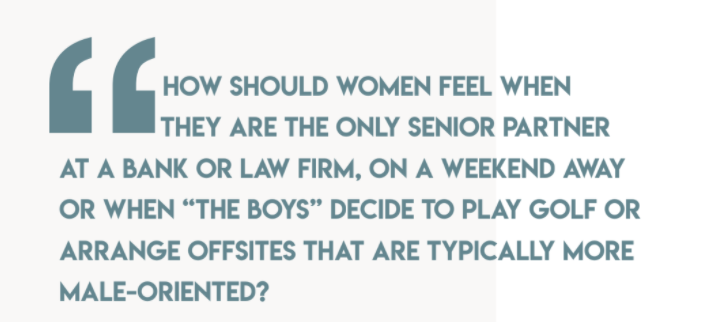
Any good mentorship starts with a discussion of mutual expectations, of what the arrangement will and will not deliver. As a mentee, expect to be challenged and be prepared to ask questions of your mentor–remember you are there to leverage their professional experience. Keep to professional topics, remember these are not your friends, these are professional relationships.
Throughout the relationship, mutual listening and a fluid exchange of ideas are crucial. Assumptions must be clarified upfront, and there needs to be an abundance of patience and humility on both sides in order for the mentorship to be truly transformational and empowering. Mentors share their social capital, wisdom, knowledge and workplace experience in a way that is transparent in order to advance the mentee’s career and find success beyond pure fiscal measures.
Mentorship provides lessons in resilience, stress management and boosting self-confidence, equipping the mentee to help them overcome any challenges they may face in the future. Importantly, these lessons are not taught in the traditional sense, but through the process of suggestion and discussion – this is about exploration and letting the mentee figure it out for themselves. At the age of 24, I was a mining analyst working for the stockbroking division of an investment bank (the only female sell-side analyst at that time). The subtle guidance of a senior corporate financier (also one of few women in her field at that time) not only reinforced my self-belief but also shared practical tips on negotiating with senior managers and deal-making that could never be found in a textbook. We remain in contact to this day.
At a time when racial tensions both in the United States and across Europe have highlighted the extent of inequality in society, mentorship is now more important than ever to help create bridges to opportunity and learning. Cross-cultural mentorship affords both sides the opportunity to learn, breakdown stereotypes and in the case of the mentee, an advancement that perhaps has been previously denied. If it is true that women of color have been kept on the economic margins in the past, mentorship is an immediate way to tackle this, through the provision of support, access to professional networks and the opening up of doors to leadership roles that previously have been closed.
For some, cross-cultural mentoring goes beyond race and ethnicity but envisages relationships where mentor and mentee may also differ on sexual orientation, disability, religion and socio-economic class. Looking at cross-cultural mentorship from this perspective is thus also a way to discover our own unconscious biases, and when we seek to unlock these biases and explore areas of mutual interest, returns are potentially limitless. Sharing commonality based on values and vision, along with a commitment to excellence and achievement, embraces inclusivity and breaks down barriers for the benefit of society as a whole.
Our views are shaped from an early age, and from a professional point of view, it is vital that mentorship begins early on in a woman’s career. Women are more likely than men to suffer from low levels of self-confidence or even imposter syndrome (a state of feeling generally inadequate or doubting one’s accomplishments and/or a persistent inner fear of being exposed as a “fraudâ€) and access to strong role models and mentoring is a practical way to boost self-confidence. A great mentor will nudge you to step up and take up a leadership position and support you during the process. We could even go as far as saying a great mentor will help us to overcome our self-limiting beliefs.
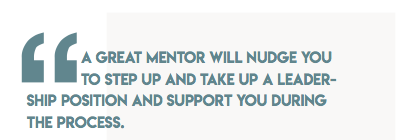
Part of the success of these programs is the networking opportunities that these coaching programs afford. “Many of these leaders seek opportunities to exchange with like-minded professionals†he went on to add. “One of the easiest ways to boost your network, and possibly find a mentor, is to attend a leadership conference. This is particularly true of conferences that promote issues that are most relevant to women leaders.â€
So what does mentorship actually deliver? How do women find a mentor? How does the mentor-mentee relationship help you move forward? Just like the old boy networks of the past, it’s all about access to advancement on the leadership track, but true mentorship goes even further, by including advocacy, support, ensuring that women have the right tools to take on greater leadership roles, challenging their thoughts, being a sounding board for ideas and even holding the mentee accountable for steps and action points that they have set out for themselves.
Effective mentorships can help women overcome individual challenges in existing organizations that perhaps relate to hierarchy and power dynamics. In this very subtle way, the existing organizational structure, biases and stereotypes are slowly challenged and gender inequality is brought to the forefront. Eventually, this can lead to organizational change and promotion of inclusion.
Can men be effective mentors to women? The answer has to be yes if we are seeking to capture complementary skills. However, we cannot get away from the fact that aspiring women leaders are most likely to look to other women already in positions of leadership.
British wheelchair racer Jade Jones was asked who helped her along the path to achievement and unhesitatingly, she replied that the guidance of her mentor, Baroness Tanni Grey-Thompson, an 11-time Paralympic medallist, provided her with inspiration rather than added pressure to perform. This was echoed by Dame Sarah Storey, who, when she became the most decorated British female Paralympian of all time also paid tribute to the same super athlete, for her leadership and inspiration.
The impact one woman can have on another is incredible, and it goes beyond that – one woman in a position of leadership can inspire hundreds if not thousands of other women. Michelle Obama, a role model to thousands of girls and young women (and doubtless mentor to several aspiring women leaders too) was once asked who she looked up to. She replied that she once saw Cicely Tyson on Broadway. “She is in her 80s and did a two-hour play with stamina and passion. I told her, ‘I want to be you when I grow up!’ [And] there’s Jane Fonda, a beautiful, engaged, politically savvy, sharp woman.†Everyone needs role models and mentors.
Oprah Winfrey has openly mentored many women in the past decades, imparting wisdom and experience, but who was her mentor? She once mentioned in an interview that one of the women who inspired, challenged and guided her was Maya Angelou, the poet and author of several books including her well-known autobiography, “I know why the caged bird sings.†Mentors help us feel passionate about what we do and push us to achieve more than we think we are capable of.
When it comes to women boosting their networks, for me it starts with mentoring. People around us can help or hinder our growth and as women, we need to exchange with several mentors throughout our careers. This is a proactive process in helping ourselves, by ensuring that our ideas are challenged by engaging with those who offer a balanced view, who also inspire us and who remind us that there are no failures, only learning opportunities. It’s those people who help us to stay focused on our goals and purposes and to keep striving for the next objective. It’s about creating a virtuous circle – the more women that are mentored, the more that will go on to mentor other women, thus dismantling the barriers that hold women back and exclude them from professional growth.
Want to read more inspiring stories about women in leadership?
Download the Geneva Business School Magazine now.
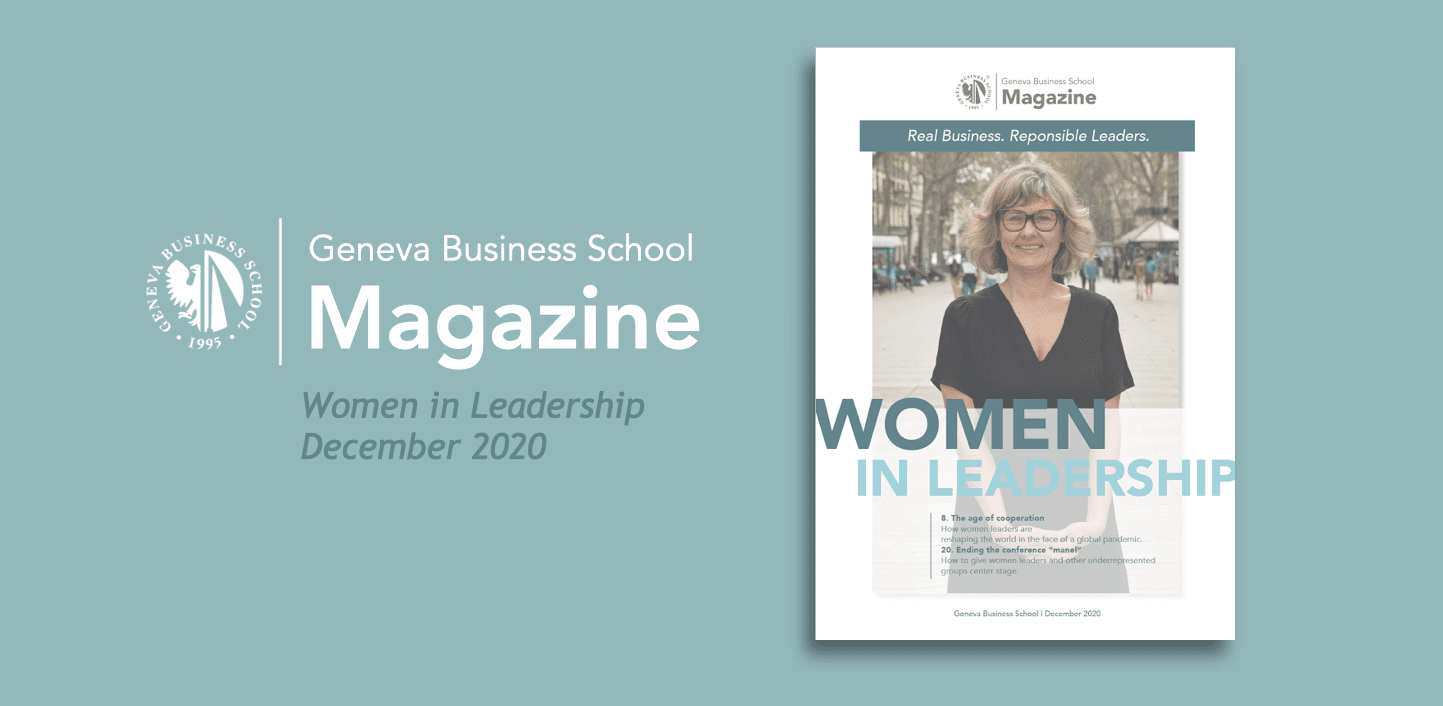
The views expressed in this magazine are those of the authors or interviewees and do not necessarily reflect the opinions of Geneva Business School or the editors of the magazine.



